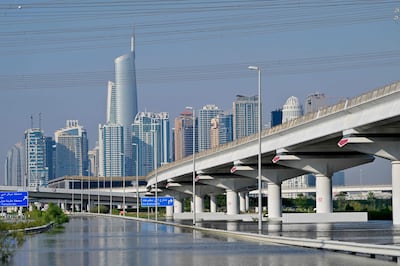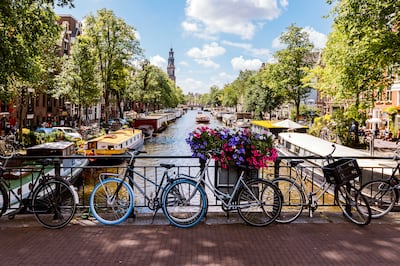After the United Arab Emirates experienced its worst storm yetsome hotels in Dubai announced reduced rates for residents in need of housing. And in Abu Dhabi, British Airways returned with its first flight to Zayed International Airport and its first to the city since the global pandemic.
A new study ranks the most and least expensive passports in the world – and the results might surprise you – while in Amsterdam, more plans are in place to combat overtourism.
Here's a roundup of recent travel and tourism news – in case you missed it.
The United Arab Emirates has the cheapest passport in the world

United Arab Emirates passport is one of the most powerful in the world and now once again ranks among the cheapest in the world.
Representing fantastic value for money compared to other destinations, the UAE passport is the cheapest travel document in a new cost ranking by Australian price comparison site Compare the Market.
At just AU$17.70, the UAE passport is valid for five years, meaning travelers only have to pay $3.54 per year. This document is also one of the most powerful passports in the world, allowing its holder to visit 183 destinations without a visa. This represents the best value in the study, since travelers essentially pay $0.15 per country they can travel to without a visa.
India has the second cheapest passport in the world, costing $18.07, valid for 10 years but providing access to only 62 countries. Hungary rounds out the bottom three spots on the list with a passport fee of just $20.75 for a five-year document that gives travelers visa-free access to 188 destinations.
At the other end of the scale, Mexico has the most expensive travel document in the world. Passport holders in the North American country must pay US$231.05 for a 10-year passport, or $23.11 per year, and with visa-free travel to 162 destinations, down 21 than those to which UAE passport holders have access.
Despite having powerful passports, countries like Australia, the United States, and Canada did not perform well in the study due to high passport fees compared to other countries.
British Airways returns to Abu Dhabi after a four-year break

British Airways has resumed non-stop flights between London and Abu Dhabi after a four-year hiatus. On Sunday, BA landed in the UAE capital with a Boeing 787-9 flight from London Heathrow, landing at the recently opened Zayed International Airport.
The British national airline will operate daily flights between the two capitals. Flights are expected to land in Abu Dhabi at 8:30 a.m. and London at 3:20 p.m.
This is the first time the airline has operated to the UAE capital since the Covid-19 pandemic.
“We welcome British Airways as it begins operating at Zayed International Airport with a daily schedule that promises to enrich connectivity and reinvigorate both business and tourism. Our new, award-winning, state-of-the-art terminal offers visitors an unprecedented introduction to the dynamic capital of the UAE, where they will be welcomed with the finest Emirati hospitality,” said Elena Sorlini, Managing Director and Managing Director of Abu Dhabi Airports. .
Flights between London and Abu Dhabi will operate with four cabin classes, including premium economy and first class. Return fares start at Dh2,610 and flight times are around seven hours.
Dubai hotels offer discounted rates to flood-affected residents

The day after Worst storm in UAEDubai residents affected by last week's record flooding may be able to seek help from the city's hotels.
Premier Inn Dubai has announced a discounted rate for people needing a safe and affordable place to stay.
Travelers can check in at branches of Dragon Mart, Silicon Oasis, Dubai International Airport and Dubai Investment Park for stays of five or seven nights. Booking prices start from Dh895 or Dh1,250 for a seven-night stay.
Since the offer was announced, Premier Inn has booked 104 nights at the special rate.
Premier Inn Dubai International Airport remains fully booked on Monday, but has limited availability for tomorrow.
There is also a 20% discount on food and drinks at the hotel's restaurants and room service for Dubai residents affected by the storm. Rates are available until May 5 and reservations can be made by telephone or on request without an appointment.
“In the wake of this week’s unprecedented storm, many residents of Dubai are facing challenges. As part of Premier Inn’s Force For Good programme, we are committed to supporting our community and providing a safe and welcoming haven during these extraordinary times,” said Simon Leigh, General Manager of Premier Inn Middle East.
Al Habtoor Group – which owns several hotels in the city, including the V Hotel Dubai, the Hilton Dubai Al Habtoor City and the Habtoor Grand Resort – hosted several families affected by the storms in its hotels free of charge.
“A number of Emirati families from Dubai whose homes were damaged have already been accommodated in the Group's hotels in Al Habtoor City,” President Khalaf Al Habtoor said in a statement on Friday.
Amsterdam slows down plans for new hotels

Famous for its magnificent canals, thriving food scene and endless bike parades, Amsterdam wants to curb the number of tourists who visit it each year by banning the creation of new hotels.
The municipal council of Amsterdam voted to prevent the construction of new hotels in order to combat overtourism. It's all part of a new “Amsterdam in Balance” campaign that aims to avoid problems caused by large numbers of visitors.
Authorities want the number of hotel stays to remain below 20 million per year, a figure that had already been exceeded in 2019, before the pandemic, when 25.2 million tourists spent at least one night in the Dutch city.
Under the rules, new hotels will only be allowed to open in Amsterdam if another one closes. And developers won't be allowed to add additional rooms to a hotel's portfolio. Hotels that have already obtained approval to launch can continue with their development plans. Officials are also encouraging developers to look for destinations outside the crowded city center.
Amsterdam recently attempted to reduce tourism by restricting other behavior, including closing bars and clubs earlier, converting former hotels into residential properties, limiting canal cruises, and banning certain cruise ships.
Updated: April 22, 2024, 11:23 a.m.


